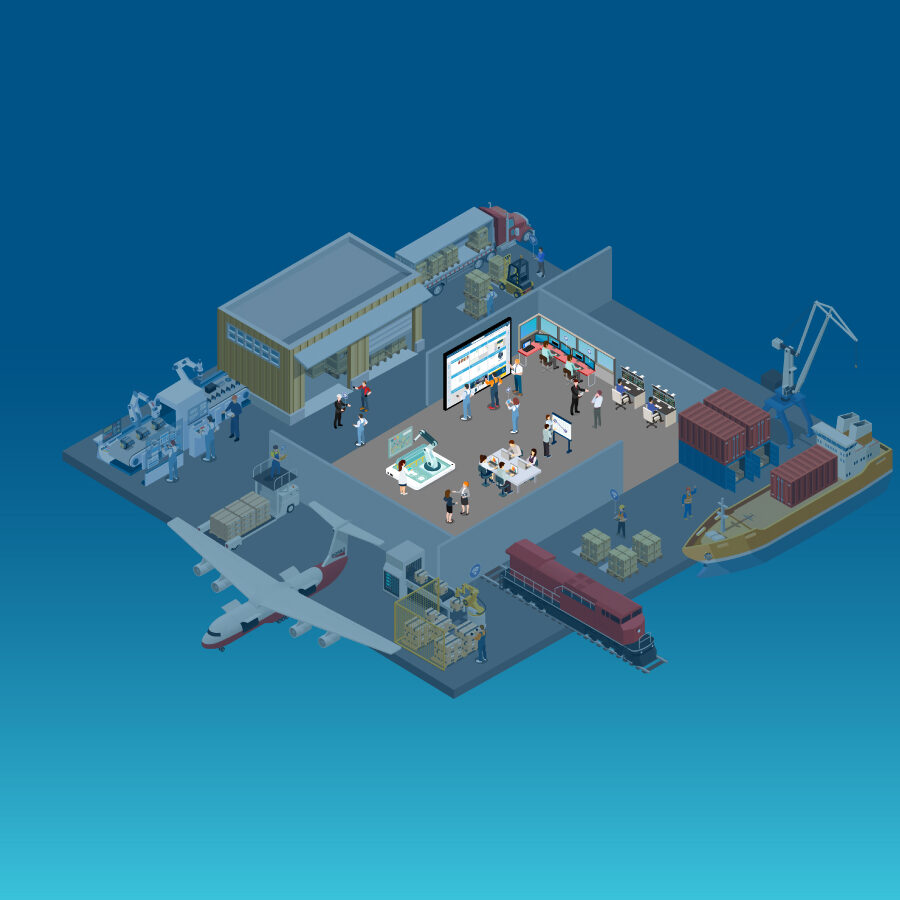Unprecedented and widespread disruption from economic and geopolitical issues—such as recession and labor shortage—has exposed vulnerabilities in supply chains around the world. This has pushed supply chains to transform to be more agile, flexible, and resilient. Innovation is necessary to mitigate the impact of future disruptions and enable businesses to recover quickly.
Many organizations have taken the first step towards this goal. They will adopt new technologies and solutions to modernize their operations and processes. This may solve certain pain points—but if they are not integrated horizontally and vertically throughout the organization, they are, at best, advanced stop-gap solutions.

Three ways to future-proof your supply chain
Chief Supply Chain Officers now have a rare chance to future-proof their supply chains. By adding three new priorities—resilience, agility, and sustainability—they can redesign their strategies for the future.
Boost supply chain resilience
Supply chains have grown in size and complexity in response to dynamically evolving customer preferences, complex portfolios, globalization and more. A natural consequence of this is the increased risk of exposure to disruptions (such as the impact of the pandemic, or the blockage of the Suez Canal). Additionally, the size and complexity make it challenging to innovate at scale.
Digitization helps companies rise to this challenge, integrating organizational processes both horizontally (across functions) and vertically (across value chain), and further aligning physical and financial flows with information flow. This provides transparency, insight, and consequently, control over business KPIs.
Advanced digital technologies like artificial intelligence (AI)/machine learning (ML), analytics platforms, simulation, etc., enable invaluable competitive advantage and foresight: intelligent decision-making to achieve favorable business outcomes for anticipated future scenarios. Digital thus empowers more sustainable operations and innovations.
4 Clusters of disruptive digital technologies
We believe these four clusters of digital technologies will enable the end-to-end digitization of supply chains:
- Commodity IoT sensors to connect/exchange data with other systems over communication networks, providing transparency and an accurate, granular overview of the network for efficient management of processes, assets and people.
- More data, faster processors and cloud computing, and access to advanced algorithms to derive insight, model, analyze and make accurate predictions to provide flexibility and efficiency.
- Robotics, cobotics, business process management and robotic process automation, image recognition, natural language processing and conversational automation to automate physical and non-physical processes for faster, efficient processing.
- Analytics platforms to combine disparate IT and OT data sources into a single system and enable performance management reporting to allow strategic overview to top management, and facilitate ad-hoc problem solving by frontline staff.
The synergy between these digital technologies provides an accurate, granular view of the whole network, with enhanced transparency, enabling flexibility, efficiency and quick, collaborative decision-making. These are the attributes of a resilient and innovative supply chain, and we, at DELMIA, can help you achieve this.
Expect supply chain disruptions
One McKinsey study found that companies can expect supply chain disruptions lasting one month or more to happen at least once every four years. On average, supply chain disruptions cost companies 45% of one year’s profits over the course of a decade.
There are ways to address this. In fact, the study revealed that during the pandemic’s early stages, a major sportswear maker accelerated a supply chain technology program that used radio frequency identification (RFID) technology to track products flowing through outsourced manufacturing operations.
Increase supply chain agility
There are also times when a company cannot keep their supply chain moving flawlessly, on-time and meeting customer demands as promised. So, what happens then? An agile supply chain should move quickly, respond to market demands and maintain flexibility when disruptions occur. Otherwise, customers may go elsewhere to a company that can. Late deliveries significantly impact how a company retains customers. Up to 69% of customers experiencing a bad delivery experience are far more likely to take their business elsewhere.
Moreover, in today’s post-pandemic economy, established brands will face new challenges. According to the Harvard Business Review, the challenge for companies is having more resilient supply chains that do not compromise competitiveness. To meet that challenge and ensure customer loyalty, any vulnerabilities need ot be addressed n order to be agile and responsive at all times.
Focus on supply chain sustainability
The next disruption to the supply chain can come at any time. Many companies are caught off-guard when disruptions happen to their suppliers at all tiers of the supply chain. Alleviate this by setting goals, reviewing all levels of the supply chain for possible disruptions, and integrating logistics planning software for higher efficiency and profitability. A clear focus on a sustainable supply chain means focusing on the future and any variables that come along with it. Sustainability has a new set of values for companies by practicing lean manufacturing software in order to conquer new markets and prepare the workforce and supply chain of the future. Organizations can then build long-term resilience, generate better growth opportunities and provide environmental and sustainable benefits to society and its customer base.
What is the DELMIA vision for the supply chain of the future?
“The DELMIA vision for the Supply Chain of the Future places digitalization at the forefront. This creates an integrated business strategy that incorporates emerging technologies, improves human decision-making, streamlines asset and inventory management, and accelerates competitive advantage.
Find out more about how DELMIA empowers the supply chain of the future“

